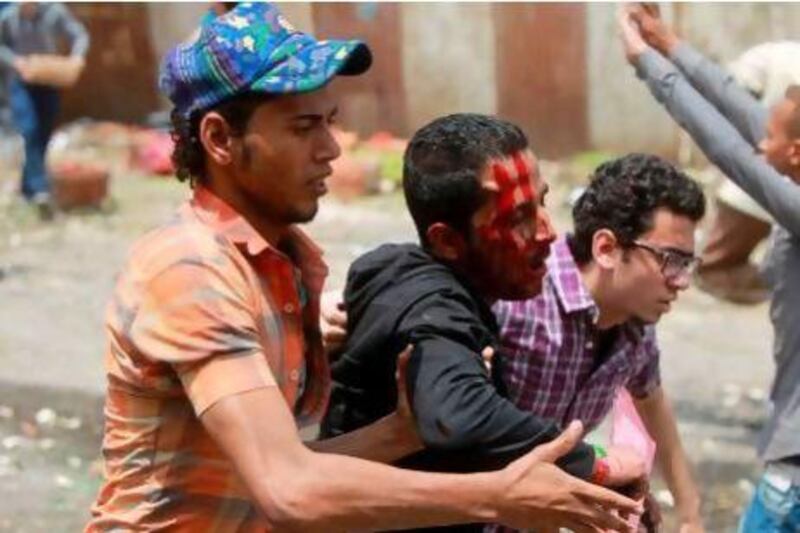CAIRO // At least 11 civilians were killed and more than 100 wounded yesterday in early-morning clashes in Cairo.
A gang of men alleged to be paid thugs attacked a group of protesters who had been camping for several days outside of the ministry of defence in Cairo's Abbaseya district.
The initial attack began around 1am with bloody battles continuing on and off until midmorning.
Police and military forces deployed in the early afternoon, bringing calm to the area more than 12 hours after the clashes began.
There appeared to be widespread use of firearms. Tarek Shalaby, a Cairo activist who visited the scene yesterday at dawn during one of the lulls in the violence, said he saw "so much blood splattered everywhere" and empty shell casings littering the ground.
The identity of the attackers remains a subject of intense speculation. Several protesters said they were either plain-clothed security officers or paid thugs, but their claims could not be verified.
The sit-in outside the defence ministry began on Friday evening, when supporters of the ultraconservative Salafist politician Hazem Abou Ismail protested at his disqualification from the presidential race on the ground that his late mother had US citizenship.
Almost immediately, the protest encampment ran into trouble. A smaller assault on Saturday, again by unidentified attackers, left one protester dead and dozens injured.
In response to that violence, many Egyptian activists rallied to the cause. They turned the Abbaseya sit-in into wider protest against the Supreme Council of the Armed Forces (Scaf), the senior generals who have run the country since Hosni Mubarak was forced out of power by a popular uprising last February.
Since assuming power, the Scaf has gradually alienated most of the country's political forces. Mr Shalaby said that by yesterday the Abou Ismail supporters in Abbaseya numbered about 30 per cent of the protesters, with the rest being hardcore anti-Scaf activists.
In the past few weeks large Friday protests in Tahrir Square have resumed, with protesters demanding that the Scaf stick to its promise to cede executive power by June 30, once Egypt's first post-Mubarak presidential elections are concluded. Egyptians are scheduled to vote on May 23-24, with runoffs, if necessary, set for mid-June and a winner to be announced on June 21.
Campaigns are in full swing with the former foreign minister Amr Moussa, the moderate Islamist Abdel Moneim Aboul Fotouh and the Muslim Brotherhood candidate Mohammed Moursi regarded as the front-runners.
Yesterday's violence prompted Mr Aboul Fotouh and Mr Moursi to announce a temporary suspension of their campaigns in protest.
"We hold the Scaf and the security forces fully responsible for the protection of the protesters," said Yehia Ahmed, a spokesman for Mr Moursi's Freedom and Justice Party.
Tonight's highly anticipated televised presidential debate, the first of its kind in Egypt, was postponed until next week. And a meeting scheduled for yesterday between the Scaf and political party leaders to discuss ways to restart the process of drafting a new constitution fell apart when more than half the party representatives boycotted in protest.
Yehia Ahmed, a spokesman for Mr Moursi's campaign, said there were "looming rumours that the Scaf is leaning toward delaying the elections".
Even before the latest violence broke out, Mr Moursi warned in a Tuesday night rally that 30 million people would take to the streets if the Scaf didn't hand over power on June 30.
Nevertheless, Egypt has already proven proficient at holding reasonably successful elections amid continuing outbreaks of violence. Last winter, the Scaf oversaw complex multiround parliamentary elections that had a robust voter turnout and were generally regarded as legitimate. Violent clashes broke out in Tahrir square a week before the first round of the regionally staggered votes, and then again in between the first and second round.
In a possible attempt to allay those fears, state media reported yesterday afternoon that the Scaf was considering handing over power immediately after the May 23-24 vote, provided there is a clear-cut winner and no run-off is necessary.





